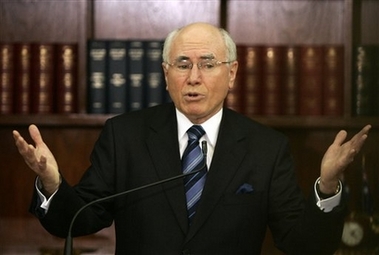Senior officials begin APEC meeting
Updated: 2007-09-02 16:29
SYDNEY, Australia - Police tightened security Sunday as senior officials from Pacific Rim nations began meetings to prepare for a summit of regional leaders that will tackle trade and global warming.
 Australia's Prime Minister John Howard gestures during a pre-APEC 2007 press conference in Sydney, Australia, Sunday, Sept. 2, 2007. Sydney will play host to the 15th APEC Economic Leaders Meeting with leaders from such nations as the USA, Russia, Japan and China attending for the week long event. [AP] |
The annual Asia-Pacific Economic Cooperation forum, with its focus on trade, has a membership includes China, Japan and the United States.
APEC, founded in 1989 to promote trade and investment in the fast-growing region, has broadened its mission over the years to include security, political, health and environmental issues.
Australian Prime Minister John Howard, the host, has said tackling climate change will be a top priority, though APEC members have been divided over previous efforts to reduce the greenhouse gas emissions that cause global warming.
On Sunday, senior officials began putting the finishing touches on a declaration that will be passed on to ministers for revisions midweek and then endorsed by the 21 leaders at their September 8-9 summit.
The officials were to first focus on the Doha round of global trade talks and ways to promote regional economic integration, David Spencer, the Australian ambassador to APEC, said opening the meeting.
Much of APEC's business, however, is not about the declaration but about giving regional leaders a chance to hobnob.
Bush is scheduled to hold a series of one-on-one meetings over subsequent days with Howard and other leaders, including Chinese President Hu Jintao, South Korean President Roh Moo-hyun and Japanese Prime Minister Shinzo Abe.
APEC members are not expected to announce any specific targets to cut carbon emissions.
Instead, the leaders likely will adopt a statement calling for members to voluntarily make "measurable and verifiable contributions to meeting shared global goals," according to a draft obtained by Greenpeace.
Observers say any consensus reached in Sydney could help chart the course for a successor to the Kyoto Protocol on global warming, which expires in 2012.
They also will discuss a longer-term proposal to create a Pacific-wide free-trade zone, dubbed the Free Trade Area of the Asia-Pacific, stretching from Chile to China and enveloping nearly half the world's trade.
The idea has gained momentum since it was first floated three years ago as a possible alternative to the Doha talks, but is widely seen as a long-term project that still faces serious questions.
|
|
|
||
|
||
|
|
|
|